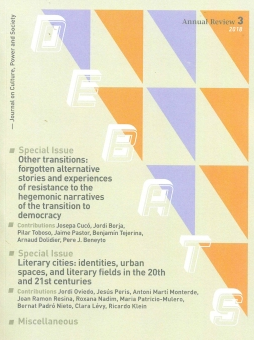Between history, myth, and the present: an asymmetric transaction
Resumen
The period known as the Spanish political transition—whose duration is still subject to debate—has been interpreted in many ways, though the dominant and official narrative is the version that portrays it as ‘exemplary’. This paper critically reviews the process that led to the relative stabilisation of a new parliamentary monarchy together with its gradual integration into the European project. We highlight the context, uncertainties, and splitting crossroads that appeared in different periods of the transition. This paper upholds the idea that the transition was an asymmetric compromise that avoided a democratic rupture with Franco’s dictatorship and its legacy. We recognise the liberties and rights that were won, but likewise, we emphasise the costs entailed in this process. In particular, the transition had a high political cost in that it fostered an elitist political culture that, in spite of several waves of protests, was not challenged by a social majority until the emergence of the most recent surge of protest as an result of the 15 May 2011 movement. Since then, the unfolding crisis of the regime—which is related to the crisis also currently affecting the EU in the aftermath of the financial and real estate crisis of 2008—as well as the internal national–territorial division in Spain, has once again put the issue of the Spanish transition, and the possible need for a ‘second transition’ or new constituent processes, under the spotlight of debate.Descargas
Descargas
Publicado
Cómo citar
Número
Sección
Licencia
Sin perjuicio de lo dispuesto en el artículo 52 de la Ley 22/1987 de 11 de noviembre de Propiedad Intelectual, BOE del 17 de noviembre de 1987, y conforme al mismo, los autores o autoras ceden a título gratuito sus derechos de edición, publicación, distribución y venta sobre el artículo, para que sea publicado en Debats. Revista de cultura, poder y sociedad.
Debats. Revista de cultura, poder y sociedad se publica bajo el sistema de licencias Creative Commons según la modalidad «Reconocimiento - NoComercial (by-nc): Se permite la generación de obras derivadas siempre que no se haga un uso comercial. Tampoco se puede utilizar la obra original con finalidades comerciales».
Así, cuando el autor o autora envía su colaboración, acepta explícitamente esta cesión de derechos de edición y de publicación. Igualmente autoriza a Debats. Revista de cultura, poder y sociedad, la inclusión de su trabajo en un fascículo de la revista para que se pueda distribuir y vender.











